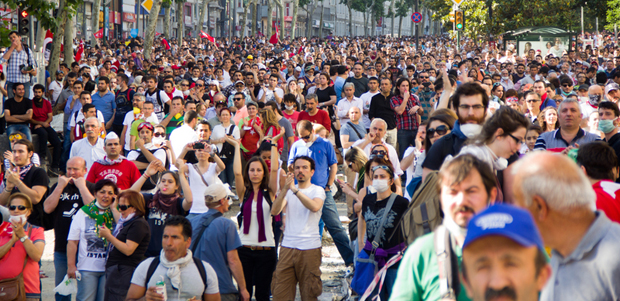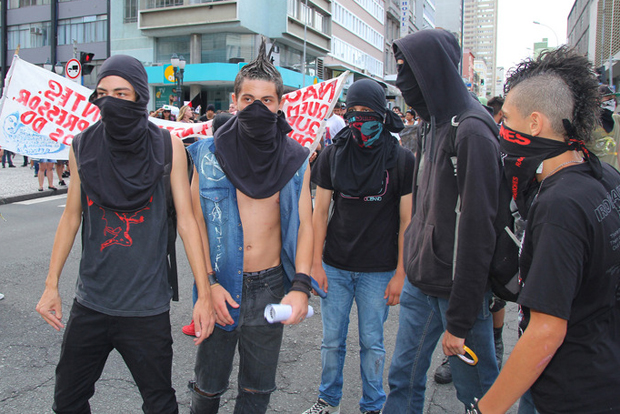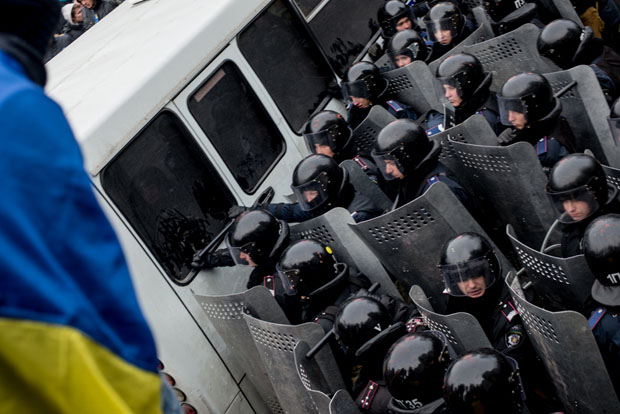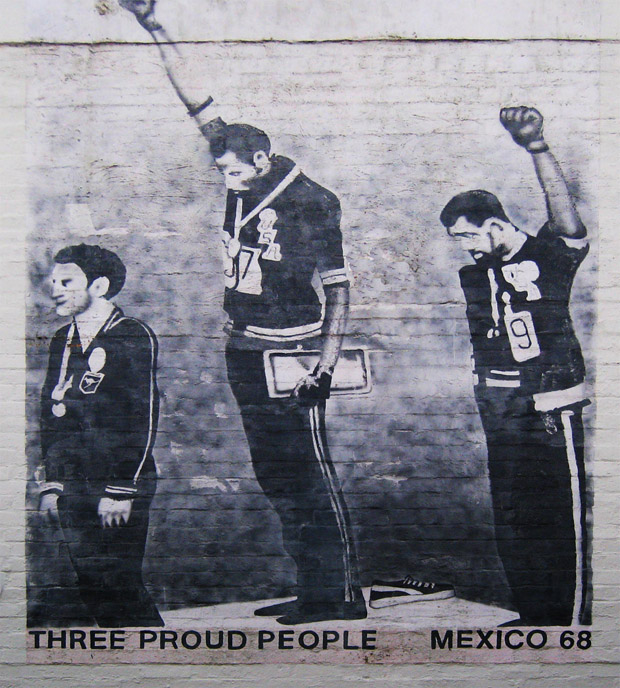4 Apr 2014 | Europe and Central Asia, Events, United Kingdom

Thousands of protesters took to the streets of Istanbul on 1 June in the capital’s Taksim Square during demonstrations over plans to turn Gezi Park into a shopping mall. (Photo: Akin Aydinli / Demotix)
Protests are commonplace in many democracies all over the world, but in the last year there have been several limitations and blockades made to this right. From the protests on several university campuses, to those in Istanbul’s Gezi Park, to the more recent protests in the Ukraine, the world has seen that the right to assembly can still be seen as a direct threat to the authorities and one they wish to suppress. However, are there ever instances when protests should be suppressed, whether because they put the population at risk or are representing an extremist ideology at odds with the rest of society?
Index on Censorship and Sussex University Politics Society are hosting a panel debate to look at the importance of the right to assembly to freedom of expression at Sussex and around the world.
The panel will be a diverse range of free speech experts, and media, academic and student representatives.
Join us on Tuesday 8th April at 6pm in Fulton 104 on Sussex University campus to debate and discuss these important issues.
10 Feb 2014 | Americas, Brazil, News and features, Politics and Society

In Curitiba, about 300 protesters took to the streets of the central city asking for more health and safety improvements in the country and against the hosting of the World Cup 2014 in Brazil. (Image: João Frigério / Demotix)
On 8 January, residents in Rio’s Metrô-Mangueira favela, were greeted by government representatives, set to demolish houses and evict residents. A demonstration was led then by the residents to fight their removal, but once again violence broke out between the police and the protestors, with police firing rubber bullets into crowds.
Rio On Watch said: “Having evicted long-time residents to public housing units without any public consultation over the use of land – required by local legislation – the city left the land and houses to be occupied by those in most desperate need of public housing.” These “desperate” residents are now being forced out and given no alternative housing, despite promises from mayor Eduardo Paes that nobody would be left homeless.
The demonstration in the Metrô favela, is emblematic of the current mood all across Brazil. Triggered by a hike in already expensive bus fares, 2013 saw Brazil’s biggest protest movement for over 20 years, in what became known as the “V for Vinegar” movement or the “Salad Revolution”. More than two million protestors took to the streets to fight against issues such as government corruption, poor social services and a rise in the cost of living. Right at the heart of the movement however, was a feeling of alienation and exclusion from the decision making process for the preparations of the 2014 World Cup.
According to the United Nations Human Rights Council, in the context of the implementation of sporting mega events, all UN states must, “ensure full transparency of the planning and implementation process and the meaningful participation of the affected local communities therein”. However this transparency is not happening in Brazil as authorities bulldoze favelas, and replace them with car parks and shopping centres.
A report by the National Coalition of Local Committees for a People’s World Cup and Olympics said: “Supported by a twisted notion of ‘public interest’, the Brazilian state has systematically refused to establish horizontal dialogues with civil society groups and threatened communities.”
In many cases residents learn of their evictions through the media before government communications. This was true for the residents of Vila Autódromo in Rio, who first learned of their proposed eviction through the front page of the O Globo newspaper on 4 October 2011.
In other cases, residents are told by authorities that their properties must be demolished because of alleged structural risks. Three hundred homes were identified for demolition because of such “structural risks” in Pavão-Pavãozinho, but residents have been waiting since July 2011 for authorities to provide evidence of such risks. This is a further example of the Brazilian government failing to offer their citizens information or ensure political transparency.
The government has established two bodies to organise the World Cup, which exist outside the normal political structure. The 2014 World Cup Steering Committee and the Committee Responsible for Host Cities liaise with FIFA, the federal government and advisory bodies mostly comprised of private companies. Decisions made by these bodies are not discussed with the public, and information regarding plans is excluded from the general population.
In Curitiba, the population unanimously opposed the council’s decision to give £22.5m to the private construction of the João Américo Guimarães Stadium. However requests for information were denied and there was no public participation in the council’s decision.
The example of the João Américo Guimarães Stadium, is typical of the wider situation whereby the government is spending billions of dollars on the construction of infrastructure and stadiums without giving the people a say in the matter. The Arena da Amazônia stadium in Manaus has cost £151m, while The Economist estimates that the Brazilian government has already spent £1.9 billion on World Cup stadiums collectively.
Marcelo Pelligrini, a journalist from São Paulo told Index on Censorship: “This is a huge stadium [Arena da Amazônia] because of the standards of FIFA, but after the World Cup we have no use for this stadium, and after the tournament it will probably become a jail.”
“The main point in Brazil is the use of these millionaire stadiums. That is what the population is complaining about. They are spending half a billion reias on a stadium that has no use after the World Cup, and we have no good transportation, no health insurance, we have nothing,” Mr Pelligrini said.
The World Cup is not benefiting the Brazilian people, according to Pelligrini: “We have great stadiums, but no good services.” He also felt that the Brazilian people were not being given democratic representation in the decision making process.
Denied a say in the preparations for the World Cup, the Brazilian people flocked to the streets in 2013, to protest against the way the government has been organising the tournament. The protests were driven by a multitude of building grievances, but a feeling that the democratic process had broken down, and the voice of the Brazilian people was being ignored, was at the heart of the demonstrations. Protestors held banners proclaiming, “FIFA go home”, “We don’t need the World Cup, we need money for hospitals and education” and “World Cup for whom?”
These sentiments epitomise the zeitgeist of the Brazilian nation, and their feeling that the World Cup has only benefited the few, while he vast majority are excluded from the decisions and thus the benefits.
The recent protest in the Metrô-Mangueira favela underlines how these grievances are ongoing. The image of residents clashing once more with riot police depicts the ultimate breakdown in communications and democracy in the lead-up to the biggest, and supposedly most unifying, football tournament in the world.
This article was posted on February 10 2014 at indexoncensorship.org
20 Jan 2014 | Europe and Central Asia, News and features, Ukraine

Clashes in Kiev between police and protesters on 19 January (Image: Julia Kochetova/Demotix)
At least 26 journalists were injured during the clashes between police and protesters in Kiev on 19 and 20 January.
According to the Institute for Mass Information (IMI), most of the reporters were wounded by stun grenades or rubber bullets used by the police while dispersing a rally in central Kiev, in protest at the new repressive legislation adopted in Ukraine last week.
IMI’s reports says the riot police on several occasions particularly targeted journalists, despite them having “Press” signs on their equipment and clothes. For instance, police officers shook a bus, while several journalists were filming the events from its roof, leading to several reporters falling off. The police attacked one of them, Denis Savchenko, a cameraman of 5 Channel. They tore his “press” badge of him and detained him briefly. The reporter now at home, with his leg broken.
Anatoly Lazarenko, a reporter of Spilno.tv online television, was shot in the hand while broadcasting live from the scene of the clashes. The reporter says the police aimed specifically at him to prevent him from reporting.
The legislation, adopted in Ukraine on 16 January 2014, has already been dubbed “the Dictatorship Law” by the country’s civil society. According to legal analysis done by experts of the Centre for Civil Liberties and Euromaidan SOS initiative, the law violates legislative procedures, runs counter to international treaties and domestic legislation and seriously restrict rights and freedoms of Ukrainian citizens.
The new law particularly targets free speech. It criminalises defamation, provides for liability for “distribution of extremist materials” and introduces a requirement for the registration of online media. It is now also forbidden to collect and disseminate information concerning law enforcement officers and judges.
The repressive law was officially signed by the President Yanukovich on 17 January, and has already come into force.
The full text of the independent legal analysis of the human rights related bills, adopted in Ukraine, is available here.
This article was posted on 20 January 2014 at indexoncensorship.org
13 Dec 2013 | Europe and Central Asia, News and features, Russia

Grafitti of Tommie Smith, John Carlos and Peter Norman showing solidarity for the civil rights movement at the Mexico City Olympics in 1968 (Image: Newtown graffiti/Wikimedia Commons)
Athletes preparing to head off to Sochi Winter Olympics in February, have been reminded that they are barred from making political statements during the games.
”We will give the background of the Rule 50, explaining the interpretation of the Rule 50 to make the athletes aware and to assure them that the athletes will be protected,” said IOC President Thomas Bach in an interview earlier this week. Rule 50 stipulates that ”No kind of demonstration or political, religious or racial propaganda is permitted in any Olympic sites, venues or other areas.” Failure to comply could, at worst, mean expulsion for the athlete in question.
Political expression is certainly a hot topic at Sochi 2014. The games continue to be marred by widespread, international criticism of Russia’s human — and particularly LGBT– rights record. The outrage has especially been directed at the country’s recently implemented, draconian anti-gay law. Put place to “protect children”, it bans “gay propaganda”. This vague terminology could technically include anything from a ten meter rainbow flag to a tiny rainbow pin, and there have already been arrests under the new legislation.
The confusion continued as the world wondered how this might impact LGBT athletes and spectators, or those wishing to show solidarity with them. Russian authorities have for instance warned of possible fines for visitors displaying “gay propaganda”. Could this put the Germans, with their colourful official gear, in the firing line? (Disclaimer: team Germany has denied that the outfits were designed as a protest.)

On the other hand, Russian president Vladimir Putin has promised there will be no discrimination at the Olympics, and IOC Chief Jaques Rogge, has said they “have received strong written reassurances from Russia that everyone will be welcome in Sochi regardless of their sexual orientation.”
On top of this, the IOC also recently announced that there will be designated “protest zones” in Sochi, for “people who want to express their opinion or want to demonstrate for or against something,” according to Bach. Where these would be located, or exactly how they would work, was not explained.
But while the legal situation in Russia adds another level of uncertainty and confusion regarding free, political expression for athletes, rule 50 has banned it for years. And for years, athletes have taken a stand anyway.
By far the most famous example came during the 1968 Olympics in Mexico City — American sprinters Tommie Smith and John Carlos, on the podium, black gloved fists raised in solidarity with the ongoing American civil rights movement. The third man on the podium, Australian Peter Norman, showed his support by wearing a badge for the Olympic Project for Human Rights. All three men faced criticism at the time, but the image today stands out as one of the most iconic and powerful pieces of Olympic history.
However, the history of Olympians and political protest goes further back than that. An early example is the refusal of American shotputter Ralph Rose to dip the flag to King Edward VII at the 1908 games in London. It us unknown exactly why he did it, but one theory is that it was an act of solidarity for Irish athletes who had to compete under the British flag, as Rose and others on his team were of Irish descent.
The Cold War years unsurprisingly proved to be a popular time for athletes to put their political views across. When China withdrew from the 1960 Olympics in protest at Taiwan, then recognised by the west as the legitimate China, taking part. The IOC then asked Taiwan not to march under the name ‘Republic of China’. While considering boycotting the games, the Taiwanese delegation instead decided to march into the opening ceremony with a sign reading “under protest”.
The same year as the Smith and Carlos protest, a Czechoslovakian gymnast kept her face down during the Soviet national anthem, in protest at the brutal crackdown of the Prague Spring earlier that year. And that was not the only act of defiance against the Soviet Union. During the controversial 1980 Moscow Olympics, boycotted by a number of countries over the USSR invasion of Afghanistan, the athletes competing also took a stand. The likes of China, Puerto Rico, Denmark, France and the UK marched under the Olympic flag in the opening ceremony, and raised it in the medal ceremonies. After winning gold, and beating a Soviet opponent, Polish high jumper Wladyslaw Kozakieicz also made a now famous, symbolic protest gesture towards the Soviet crowd.
But there are also more recent examples. At Athens 2004, Iranian flyweight judo champion Arash Miresmaeili reportedly ate his way out of his weight category the day before he was set to fight Israeli Ehud Vaks. “Although I have trained for months and was in good shape, I refused to fight my Israeli opponent to sympathise with the suffering of the people of Palestine” he said. A member of the South Korean football team which beat Japan to win bronze at the 2012 London Olympics, celebrated with a flag carrying a slogan supporting South Korean sovereignty over territory Japan also claims.
When the debate on political expression comes up, the argument of “where do we draw the line” often follows. If the IOC is to allow messages of solidarity with Russia’s LGBT population, should they allow, say, a Serbian athlete speak out against Kosovan independence? Or any number of similar, controversial political issues? Is it not easier to simply have a blanket band, and leave it at that?
The problem with this is, as much as the IOC and many other would like it, the Olympics, with all their inherent symbolism, simply cannot be divorced from wider society or politics. The examples above show this. With regards to Sochi in particular, the issue is pretty straightforward — gay are human rights. Some have argued we should boycott a Olympics in a country that doesn’t respect the Universal Declaration on Human Rights, or indeed the Olympic Charter. This is not happening, so the very least we can is use the Olympics to shine a light on gay rights in Russia. At its core, the Olympics are about the athletes — they are the most visible and important people there. It remains to be seen whether any of them will take a stand for gay rights, outside cordoned-off protest areas, in the slopes and on the rink, where the spotlight shines the brightest. And if they do, they should have our full support.
This article was posted on 13 Dec 2013 at indexoncensorship.org





